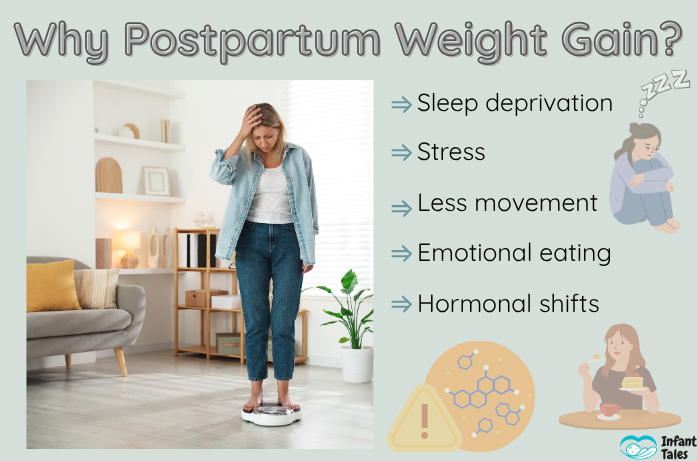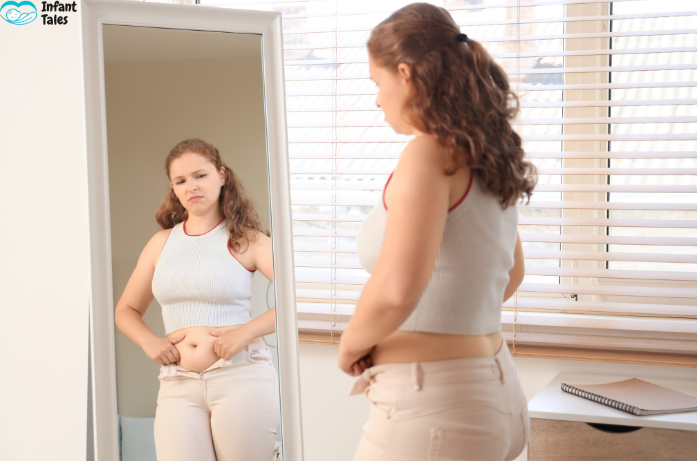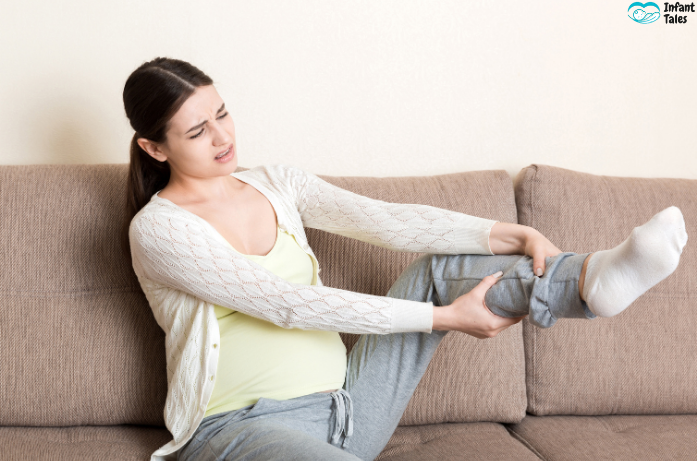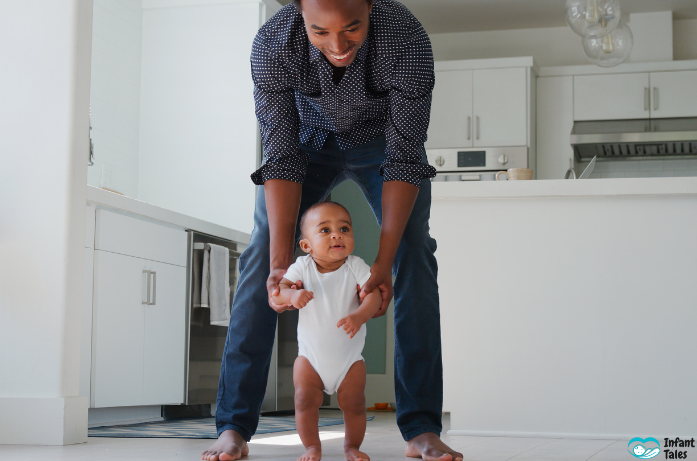By a Caring Mom at Infant Tales
After childbirth, many mothers expect their bodies to “recover” quickly but for most, this is far from reality. Instead of losing weight immediately, some women find the number on the scale stays the same or even increases. This may seem frustrating, but it’s completely normal. Postpartum weight gain happens to many new mothers, and it doesn’t mean you’re doing anything wrong.
Your body has just gone through an extraordinary period creating, nurturing, and giving birth to life. Now it’s focused on healing, restoring balance, and adapting to a completely new routine filled with sleepless nights, breastfeeding schedules, and emotional changes. Hormones, metabolism, and lifestyle changes all play a role in your body’s response during this phase as supported by Johns Hopkins Medicine, recovery after pregnancy is a gradual process that requires patience and care.
So if you’re wondering why you’re gaining weight after pregnancy, take a deep breath you’re not alone. It’s your body’s way of healing and protecting itself. In the following sections, we’ll explore the real reasons behind postpartum weight gain, how to manage it safely, and ways to feel comfortable and confident in your body again.
Is It Normal to Not Lose Weight After Giving Birth?
Yes, it’s completely normal. While some women lose weight soon after childbirth, others find it harder and both experiences are valid. Research shows that many moms still retain around 10–12 pounds even six months after delivery, according to findings published in the National Institutes of Health (NIH).
The difference between postpartum weight loss vs weight gain can depend on your body type, metabolism, sleep, stress levels, and activity routine. Some women even notice weight gain in the first few months postpartum, especially if they’re breastfeeding or adjusting to hormone changes.
The key is to remember that your body is healing not failing. It took nearly a year to grow your baby, so give it time to recover.

Why Postpartum Weight Gain?
If you’ve asked yourself, “Why am I gaining postpartum weight?”, the answer often lies in a combination of physical and emotional factors.
Here are a few common ones:
- Sleep deprivation: Lack of rest increases hunger hormones, leading to more snacking.
- Stress: The body releases cortisol when under stress, which promotes fat storage, especially around the belly.
- Emotional eating: Caring for a newborn can be overwhelming, and food often becomes a comfort.
- Less movement: Your old routines, gym time, or walks may have taken a backseat.
- Hormonal shifts: Hormonal imbalance after pregnancy weight gain is very common, and it takes time for hormones to settle.
A Frontiers in Endocrinology review explains that postpartum hormonal changes, including shifts in estrogen and cortisol, influence metabolism and energy balance during recovery.
Postpartum Weight Gain While Breastfeeding
Many moms assume that breastfeeding will help shed the extra pounds quickly. While that’s true for some, others experience postpartum weight gain while breastfeeding and here’s why.
Breastfeeding burns calories, but it also increases appetite. The hormone prolactin, which stimulates milk production, signals your body to store a bit of fat as an energy reserve. Combined with late-night feedings and carb cravings, this can make weight management difficult.
The Cleveland Clinic explains that while breastfeeding supports calorie burning, it’s essential to eat balanced meals and stay hydrated rather than restrict calories your body needs nourishment to recover and sustain milk supply.
Hormonal Imbalance After Pregnancy and Weight Gain
Your hormones play a massive role in how your body responds after childbirth. A hormonal imbalance after pregnancy can cause fatigue, sluggish metabolism, mood swings, and yes weight gain.
After delivery, estrogen and progesterone drop while prolactin (for breastfeeding) and cortisol (from stress) rise. This can slow fat metabolism and lead to water retention. In some cases, thyroid function changes may result in postpartum hypothyroidism symptoms include tiredness, dry skin, and unexplained weight gain.
If these sound familiar, speak to your doctor. The American Academy of Family Physicians (AAFP) notes that postpartum thyroiditis and hormonal fluctuations are common but manageable with proper diagnosis and care.
Postpartum Belly Fat Causes
Many moms notice that their belly looks different even months after birth. The common postpartum belly fat causes include:
- Abdominal muscle separation (diastasis recti)
- Hormonal fat storage (especially due to high cortisol levels)
- Less physical activity during recovery
- Bloating or slower digestion from hormonal shifts
This soft belly is a natural part of healing. According to Pregnancy Birth and Baby (Australian Government), gentle core strengthening, walking, and good posture can help tone the abdomen over time no extreme workouts needed.
Postpartum Metabolism Changes
Your metabolism changes throughout pregnancy and postpartum. During pregnancy, it speeds up to support your baby. After birth, it slows down as your body heals and adjusts to a new routine.
Postpartum metabolism changes can make it harder to lose weight initially. Lack of sleep, irregular eating, and skipped meals can also confuse your body into holding fat.
To support your metabolism naturally:
- Eat small, frequent, balanced meals.
- Include protein and fiber at each meal.
- Stay hydrated.
- Add light movement daily even stroller walks count!

Healthy Diet for Postpartum Moms
A healthy diet for postpartum moms focuses on nourishment, not restriction. Your body needs fuel to recover, care for your baby, and maintain energy.
Try including:
- Lean proteins: Include eggs, fish, lentils, tofu, or chicken to help repair tissues and rebuild muscle strength after delivery.
- Whole grains: Choose oats, brown rice, quinoa, or millet for long-lasting energy and better digestion.
- Colorful veggies and fruits: Add a variety of vegetables and fruits for essential vitamins, fiber, and antioxidants that boost recovery and immunity.
- Healthy fats: Eat avocados, nuts, seeds, and olive oil to support hormone balance and maintain steady energy levels.
- Iron and calcium: Strengthen your body with iron-rich foods like spinach, lentils, red meat, and pumpkin seeds, and calcium-rich foods such as milk, yogurt, cheese, almonds, and ragi to rebuild bones and prevent fatigue.
Avoid skipping meals that can slow your metabolism and make you more tired.
Postpartum Exercise Routine
Once your doctor gives you the green light (usually 6–8 weeks postpartum), start a gentle postpartum exercise routine. It doesn’t need to be intense to be effective.
Start with:
- Walking: Great for mental and physical health.
- Yoga or Pilates: Helps with posture, relaxation, and core strength.
- Pelvic floor exercises: Strengthens your lower muscles after delivery.
- Light resistance workouts: Build stamina gradually.
If you had a C-section or complications, always wait for your doctor’s approval before beginning any exercise.
How to Lose Weight After Childbirth
Wondering how to lose weight after childbirth safely? The answer lies in small, consistent habits:
- Eat mindfully: Avoid fad diets. Focus on nourishing foods.
- Move daily: Even short walks make a difference.
- Sleep when you can: Fatigue can trigger overeating.
- Hydrate: Water boosts energy and milk supply.
- Be patient: Real change takes time, not pressure.
Your body doesn’t need to “bounce back” it needs time to rebuild strength and confidence.
How Long to Lose Baby Weight Naturally
There’s no fixed answer for how long to lose baby weight naturally. Some women return to pre-pregnancy weight within six months, while others take a year or longer.
Factors like hormones, sleep, stress, and activity levels all play a role. The goal isn’t to rush but to care for yourself. Your body is still adjusting, and gradual, steady progress is far more sustainable than rapid loss.
According to Pregnancy Birth and Baby, it’s safest to aim for gradual, steady weight loss around half a kilogram per week through balanced eating and light activity.
Final Thoughts
Postpartum weight gain is not failure, it’s part of your recovery story. Your body is healing, balancing hormones, and adapting to motherhood. Rather than rushing to “bounce back,” focus on nourishing yourself, staying active, and celebrating progress in every form.
With time, consistent habits, and compassion for yourself, your body will settle into its natural balance again. Remember: motherhood isn’t about perfection, it’s about strength, love, and resilience.
FAQs About Postpartum Weight Gain
1. Is postpartum weight gain normal?
Yes, it’s completely normal. Your body is healing, adjusting hormones, and rebuilding strength after childbirth.
2. Why am I gaining weight postpartum while breastfeeding?
Breastfeeding hormones can increase appetite and promote fat storage, it’s your body’s way of protecting milk supply.
3. What causes postpartum belly fat?
Hormonal shifts, muscle separation, and reduced activity are common postpartum belly fat causes.
4. How can I lose weight after childbirth safely?
Start slowly with light exercise, eat balanced meals, and stay hydrated. Avoid crash diets, especially if breastfeeding.
5. How long does it take to lose baby weight naturally?
Most moms lose baby weight within 6–12 months, but every body is different, patience is key.
You are not alone, Every journey is different, and every body is beautiful in its own time. Visit Infant Tales for more uplifting articles on motherhood, postpartum wellness, and baby care written with warmth, wisdom, and love.
Disclaimer: This article is intended for informational purposes only and should not replace professional medical advice. Always consult your doctor or a licensed health expert before making changes to your postpartum diet or exercise plan.



